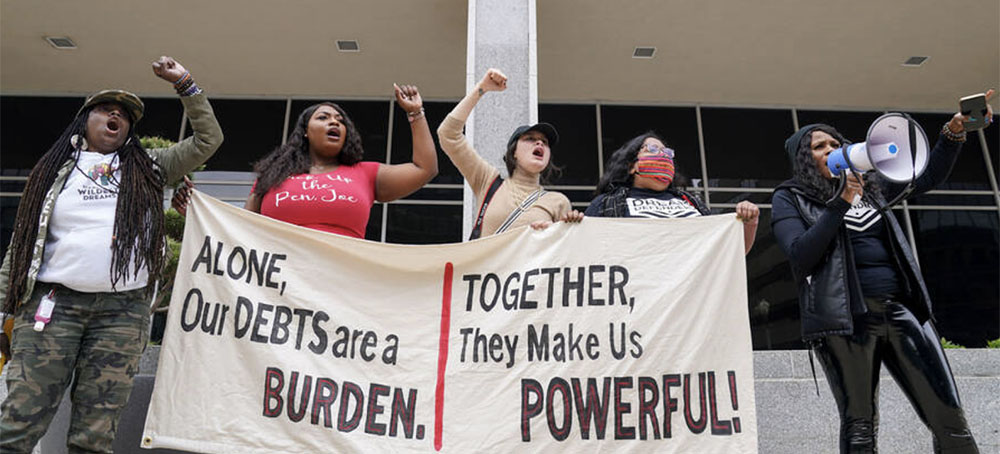Live on the homepage now!
Reader Supported News
He could be at a hotel. Or the whole "undisclosed location" business could be a product of the right-wing puke funnel.
Justice Alito and his family have been moved to an undisclosed location. Let us pray for he and his family’s safety.
This was a tasty morsel, especially served up on the night when the neighbors dropped by Brett Kavanaugh’s place—and the Roberts manse—to explain their disappointment. A sweet buffet of leftist extremism served up to the gullible dinner crowd, which included famous legal apologist Jonathan Turley and something called LifeNews, which has little to do with either one. Eventually, all god’s children got on board. (Hi, Ted Cruz. Can I sell you these magic beans?) This lasted until Monday, when the statue came down. From Politico:
The reports seem to be fueled by comments from conservative lawyer and author Ilya Shapiro, who said on a Saturday Fox News program that he “heard that Justice Alito has been taken to an undisclosed location with his family.” Shapiro told POLITICO Monday that he was unsure whether that was, in fact, true. “I don’t have any non-public sources,” he said. “I forget whether I saw the rumor on Twitter or somebody told me. I don’t know.”
Couldn’t find a good psychic on a weekend, I guess.
Now, it’s entirely possible that the Clan Alito is hunkered down somewhere, but it’s not as though they’re eating surplus MREs in an abandoned missile silo in South Dakota. My money is on a lovely resort hotel.
Or the whole story is made-up sludge arriving via a fully armed and operational puke funnel. And Kristan, barbecuing the Ninth Commandment? And on the Lord’s Day, too? You got some confessin’ to do. Also, “Students4Life.” Dropping that numeral in the middle there doesn’t make you Prince. Never will.
 Kyiv. (photo: Ukrayinska Pravda)
Kyiv. (photo: Ukrayinska Pravda)
 Protest outside of U.S. Department of Education. (photo: The Debt Collective/In These Times)
Protest outside of U.S. Department of Education. (photo: The Debt Collective/In These Times)
 Sen. Elizabeth Warren at a rally in front of the U.S. Supreme Court on Tuesday. (photo: Alex Wong/Getty Images)
Sen. Elizabeth Warren at a rally in front of the U.S. Supreme Court on Tuesday. (photo: Alex Wong/Getty Images)
Republicans spent decades fighting relentlessly to overturn Roe v. Wade. Democrats need to learn from their example.
Some expressed righteous outrage: Nancy Pelosi called the decision an “abomination,” while Elizabeth Warren practically shook with fury as she told reporters she was “angry, upset, and determined” to save abortion rights. Others turned to political symbolism: Chuck Schumer promised that the Senate would vote on a bill codifying Roe’s protections nationally, which is almost certain to fail, but will force lawmakers to “show which side they’re on,” as the majority leader put it.
Above all, they urged Democrats to get out and vote in the coming midterms. President Joe Biden said protecting women’s reproductive rights would “fall on voters to elect pro-choice officials this November” in a White House statement. Rep. Sean Patrick Maloney, head of the Democratic Congressional Campaign Committee, was a bit less artful, tweeting, “it’s November, stupid.”
What top Democrats did not do—as far as I could tell—was clearly acknowledge just how long the road is likely to be for pro-choice Americans who want to restore what they will have lost, even if they do show out in force for the next several elections. It took conservatives and the religious right nearly 50 years to undo the constitutional right to an abortion. Thanks to the institutional disadvantages working against Democrats, clawing those rights back could very easily become its own generational challenge, long on defense and short on instant gratification.
Many of the reasons—gerrymandered states, the rural skew of the Senate, and the relatively young age of the conservative Supreme Court justices—are familiar by now to politics junkies. But it’s worth examining the obstacles one by one, for politicians to make them clear to voters so they can truly understand the road ahead.
In the very short term, Democrats lack the votes to enact a federal statute protecting abortion rights. The party has 50 seats in the Senate, and one of them belongs to Joe Manchin, who identifies as pro-life and voted with Republicans to block such a bill in February. He and fellow centrist Kyrsten Sinema have also said they won’t lift the filibuster in order to pass a bill.* The most Democrats can muster right now is a show vote that might one day provide grist for attack ads against battleground-state Republicans, such as Maine’s Susan Collins.
Even if there were enough votes to write Roe into federal law, there’s a strong chance the Supreme Court would strike it down. The bill Democrats plan to introduce, the Women’s Health Protection Act, would regulate abortion based on Congress’ power to oversee interstate commerce. But there’s a long-running debate about whether that would be a legally valid exercise of lawmakers’ authority, and the justices who appear ready to unravel Roe could pretty easily reject the law simply by ruling that, no, abortion does not count as interstate commerce. (On the bright side, that might also block Republicans from passing a national abortion ban, since such a law would likely have to be rooted in the commerce clause as well.)
In order to have the best possible shot of restoring abortion rights nationally, Democrats will likely need to win back control of the Supreme Court—either to reestablish a constitutional right to the procedure or bless a federal law codifying Roe. That task will be very, very difficult in the near future, given the relatively young ages of the conservative justices—the oldest, Clarence Thomas, is still just 73—and their 6–3 majority. The most surefire way to do it would be for Democrats to either pack the court or otherwise reform it to reshuffle the high bench’s ideological balance.
But such a move would require solid majorities in Congress willing to play hardball for control of the government’s institutions. Because of the structural disadvantage Democrats currently face in the Senate due to their unpopularity among overrepresented rural voters, the party probably isn’t going to win that power anytime soon.
A recent post at Slow Boring by Simon Bazelon illustrated just how dire the Democrats’ Senate math is at the moment. The Yale student and Democratic number cruncher calculated that even if Democrats won 50 percent of the national vote in this year’s midterms and 52 percent of the popular vote in 2024’s presidential race, they would likely lose control of the Senate, ending up with 43 or 44 Senate seats.
To put that in perspective, Democrats are currently trailing Republicans on the generic congressional ballot 45.4 to 42.8, according to the FiveThirtyEight polling average; meanwhile, Biden won just over 51 percent of the popular vote in 2020. In other words, even if Democrats do come out and vote like mad and way overperform expectations, it’s highly likely they’ll still end up powerless in the Senate from now into the near future.
It’s possible Bazelon is being overly pessimistic: He assumes that Senate races will closely track the nationwide vote the way they have in more recent elections where ticket splitting declined, but it’s possible that won’t be the case in 2024. Or, who knows, maybe Democrats will stumble on the magic formula to win back rural voters they lost to Trump.
But his calculations give a sense of the difficult terrain ahead. The Senate math is simply not good, and probably won’t be for many years, unless Democrats find a way to change up their coalition.
What about state-level fights to protect abortion rights? In several key cases, the deck is stacked against pro-choice voters thanks to severe partisan gerrymanders.
In Florida and Wisconsin, polling suggests voters are solidly in favor of legal abortion in most cases. In Texas and Georgia, they’re almost evenly split. But all four states, which are home to about 68 million Americans, or 20 percent of the country, have laws in place that will ban or restrict abortion when Roe falls. (In Texas’ case, the statute is already in effect.) Each also appears set to end this redistricting cycle with skewed maps that lock in GOP political power for the next decade.
This is part of what makes Alito’s opinion, and its declaration that “the authority to regulate abortion must be returned to the people and their elected representatives,” so galling. The court now ready to decree that women’s reproductive rights should be decided democratically has also disempowered voters by allowing states to continue gerrymandering, while also gutting the protections of the Voting Rights Act. How convenient.
None of this is meant to suggest pro-choice Democrats should retreat into hopelessness, however. To protect the right to an abortion, they need to vote more urgently than ever.
The best way to prevent Republicans from passing a national abortion ban is to minimize Democratic losses in the House and Senate and to hold on to the White House. There are a number of states where the legislatures and governors’ mansions are truly up for grabs, and abortion will essentially be on the ballot over the coming years. They include places like North Carolina and Michigan, where the legislative maps have been newly un-gerrymandered, as well as battleground states like Pennsylvania and Minnesota. In some states, such as Florida, ballot initiatives could be a way to protect abortion rights when legislators won’t. Every campaign cycle will bring real fights to win.
But those victories will often amount to successful defenses of the status quo. They’re likely to be interspersed with more painful losses—maybe catastrophic ones if Republicans win a trifecta in Washington and go for a national ban. So while it’s understandable that Democrats are currently focused on the short-term politics of the midterms, they must also make it clear to pro-choice voters that they need to prepare for a long march if they want to restore abortion rights. It might not take 40 years. But conservatives are poised to triumph on this issue because they found the discipline to wage almost a half-century of political trench warfare.
Pro-choice Americans can take some inspiration from that, and find the same marathon determination to fight for their beliefs.
 Rudy Giuliani. (photo: Drew Angerer/Getty Images)
Rudy Giuliani. (photo: Drew Angerer/Getty Images)
Georgia election workers were dragged through the mud on OAN by right-wing conspiracy theorists like Rudy Giuliani. Now the network is finally acknowledging there was no fraud.
The segment notes that an investigation by state officials into unsubstantiated claims of widespread voter fraud made by ex-President Donald Trump and Rudy Giuliani turned up nothing. “The results of this investigation indicate that Ruby Freeman and Wandrea ‘Shaye’ Moss did not engage in ballot fraud or criminal misconduct,” a narrator states.
“A legal matter with this network and the two election workers has been resolved to the mutual satisfaction of the parties through a fair and reasonable settlement,” the voiceover adds.
Freeman and her daughter, Moss, say they were harassed online and in person after baseless rumors began circulating online, due in part to content published by the conspiracy website The Gateway Pundit, which the pair also sued.
In January 2021, when Trump pressured Georgia Secretary of State Brad Raffensperger to try to “find” votes to overturn the state’s election results, he mentioned Freeman’s name 18 times. Freeman was also visited by a publicist for Kanye West, who threatened her in an effort to extract a confession about committing election fraud.
And if that weren’t enough, video of the pair doing their jobs was hyped up by Rudy Giuliani—and Sean Hannity—who falsely claimed that it showed “blatant, clear, obvious” fraud. While speaking to Georgia State House Republicans about the video during a Zoom meeting in December 2020, Giuliani at one point can be heard saying, “We should try to get this on Newsmax and OANN.”
Freeman and Moss sued Giuliani as well, and that case is ongoing.
 'In Argentina, there are multiple reasons behind the expansion of the green tide and the demand for legal abortion from below.' (photo: EPA)
'In Argentina, there are multiple reasons behind the expansion of the green tide and the demand for legal abortion from below.' (photo: EPA)
A leader of Argentina’s Ni Una Menos movement on how to fight back
In Argentina, there are multiple reasons behind the expansion of the green tide and the demand for legal abortion from below. On the one hand, there is the long history of activism by the Campaign for the Right to Legal, Safe, and Free Abortion, formed 15 years ago as a nationwide network, defined by its federal character and its emphasis on participatory democracy and pluralism. On the other hand, more recently the feminist movement reached the mass scale with mobilizations for “Ni Una Menos. Vivas y libres nos queremos” (“Not One Woman Less. We want ourselves alive and free”), against the multiple and interconnected forms of gender-based violence. These were tied to the organization of the international feminist strikes that drew connections between feminized economic violence and precarity and other forms of gender-based violence.
An important element for understanding the massiveness of these mobilizations was precisely the way in which the struggle for abortion was woven together with other feminist struggles. This allowed for cognitively and politically connecting the different forms of violence against women and feminized bodies as systemic violence. The violence of often deadly and costly clandestine abortion was thus connected to domestic violence, sexual harassment and the gendered pay gap in the workplace, and to the murders of female environmental and Indigenous activists in rural areas. In turn, this enabled constructing the demand for abortion in terms that go beyond a merely individual right, challenging the conception of the body as private property.
The green tide flooded spaces everywhere, including schools, slums, unions, squares, and soup kitchens. Through this transversality, the body that had been put up for debate took on a collective and class dimension. This occurred because discussion about the clandestine condition of abortion directly referred to the costs that make it differentially risky according to one’s social and economic position. Those who were most harmed by the criminalization of abortion were the women and people with the capacity to gestate with the fewest economic resources, those who could not pay for safe abortions. Therefore, the right to abortion was considered inseparable from the demand that it be guaranteed in the public health care system. In turn, the demand for comprehensive sexual education in the public education curriculum allowed for deepening debates about sexualities, corporealities, relationships, and affects, displacing the question in a radical way.
In this way, the broadening of the debate over abortion took place in terms of autonomy and class. Young people took leadership in the streets, with the patient support of the “pioneers” from older generations. New language became common sense, using gender-neutral terms in the highly gendered Spanish language, and specifically speaking of gestating persons, thanks to the struggle of non-binary people and trans men. The movement combined parliamentary lobbying with the autonomous practices of self-organized underground networks that had made abortion possible for many every year with massive and heterogeneous mobilizations in the street.
Finally, the green tide has became an internationalist impulse mapping out struggles and legislation, bringing together a feminist agenda that goes well beyond a demand for an individual right. Understanding the relationship between unpaid and/or badly paid labour and expensive and unsafe abortions enabled a broader analysis of the forms of precarisation of our lives, modes of control in the name of the democracy of the labour market, and ecclesiastic tutelage over desire and autonomous decision-making. Furthermore, abortion has become the banner for rekindled regressive forces that articulated a true conservative counter-offensive. An internationalist perspective allows us to both map the global dimension of those reactionary forces and take inspiration and learn from struggles that have successfully linked the right to abortion to other feminist demands and attacks on collective autonomy.
 Deforestation in the Brazilian Amazon. (photo: Stephanie Maze)
Deforestation in the Brazilian Amazon. (photo: Stephanie Maze)
Last month, Brazil’s National Institute for Space Research (INPE) reported that the tropical rainforest experienced record deforestation during the first three months of the year. Now, the agency says that deforestation rates for April broke the record for the month, reflecting the extractivist policies of right-wing Brazilian President Jair Bolsonaro.
“The cause of this record has a first and last name: Jair Messias Bolsonaro,” Marcio Astrini, who leads the Brazilian environmental group Climate Observatory, said in a statement reported by Reuters.
The forest lost 390 square miles during the first 29 days of April, the agency said. It will report figures for the last day of the month later this week. Deforestation this April is up 74 percent from the same month last year, when the previous April record was set, AP News reported.
The April record is also the third monthly record set this year: January and February also saw record deforestation, according to Reuters. Further, the first four months of 2022 also broke a record for the first four months of a year, seeing 754 square miles of forest cleared, an area more than double the size of New York City. This is also 69 percent more than during the same period in 2021.
This amount of deforestation is especially disturbing because Brazil is currently in its rainy season, Al Jazeera reported. This is a time when it is typically harder for loggers to cut down trees.
“This figure is extremely high for this period of the year,” World Wildlife Fund Brazil science director Mariana Napolitano said in a statement reported by Al Jazeera. “It’s an alert of the immense pressure the forest is under.”
Another alarming sign is the region where the deforestation is taking place, according to AP News. The Amazonas state saw more deforestation in April than Para and Mato Grosso states. This is worrying because Amazonas is more remote and has more pristine forest. However, Bolsonaro has promised to pave a 250-mile stretch of the BR-319 highway in the southern part of the state, where the deforestation is concentrated. This promise has led to illegal tree-clearing as speculators hope that cattle grazing or agriculture will become legal once the road is paved. This April marks only the second time on record that Amazonas has seen the most deforestation.
“Amazonas is still a very preserved state. If deforestation explodes there, we will lose control of a region that is outside the traditional deforestation region,” Climate Observatory senior public policy specialist Suely Araújo told AP News.
The Amazon rainforest is an important sink for carbon dioxide and preserving it is seen as essential for combating the climate crisis. However, scientists are concerned it could reach a tipping point if deforestation persists, converting to grassland and releasing carbon dioxide instead of storing it.
Bolsonaro has come under fire from the international community because of his policies weakening environmental protections and regulations as well as Indigenous rights. He is currently campaigning for reelection in October, according to Al Jazeera.
In response, actor and activist Leonardo DiCaprio urged Brazilians to register to vote on Twitter late last month.
“Brazil is home to the Amazon and other ecosystems critical to climate change,” he wrote. “What happens there matters to us all and youth voting is key in driving change for a healthy planet.”
Amazon Environmental Research Institute science director Ane Alencar told Reuters that deforestation would likely continue to climb until the election, since officials tend not to crack down on illegal activities during election years out of fear of alienating voters.
“It seems that the clearing of forests has become institutionalized in the country as something common, with record after record,” she told Reuters.
Special Coverage: Ukraine, A Historic Resistance
READ MORE
Follow us on facebook and twitter!
PO Box 2043 / Citrus Heights, CA 95611


No comments:
Post a Comment
Note: Only a member of this blog may post a comment.